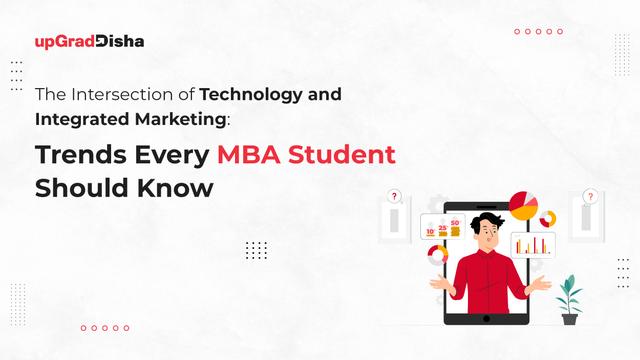The Intersection of Technology and Integrated Marketing: Trends Every MBA Student Should Know
June 5th, 2024: 4 mins
|
This Article Explores:
|
Technological innovations have revolutionized multiple industries, and the vast marketing field is no exception. It has completely transformed how brands interact with customers and create demand for products and services.
Earlier, marketing relied heavily on traditional methods such as print advertising, billboards, and television commercials. However, the advent of innovative technological solutions, such as Artificial Intelligence and Machine Learning, has significantly changed the way companies approach marketing strategies.
A recent report claimed that as much as 14% of organizations are currently using generative AI for marketing and sales. In addition, 69% of executives believe that using AI in marketing will give rise to new job roles.
As an MBA aspirant, you must stay ahead of the curve by understanding the intersection of marketing and technology, especially if you’re pursuing an MBA in Integrated Marketing. On that note, mentioned below is a detailed article wherein we will explore some of the key tech-integrated marketing trends in this exciting and ever-changing field.
“AI can root out unconscious biases so that we get a true representation of the value exchange that the brand wants to have with the customer” - Bob Lord |
How Technology is Revolutionizing Marketing
The MarTech industry has come a long way since its inception, as have the innovations developed through the years. Some of the most popular technology-driven marketing trends include,
-
Artificial Intelligence and Machine Learning
Artificial Intelligence (AI) and Machine Learning (ML) are revolutionizing marketing by automating repetitive tasks, personalizing customer experiences, and predicting future trends. Furthermore, with the help of AI-driven analytics, marketers can now unlock key information about their target audience, enabling them to create highly effective and personalized campaigns.
-
Augmented Reality and Virtual Reality
Marketing technology integration oversees AR and VR as its most impactful tool, offering marketers the ability to captivate customers in ways unimaginable. With the consistent assimilation of these technologies in broad domains like marketing, the global AR advertising market is expected to hit US$ 5.2 billion by the end of 2024.
With augmented Reality, customers can interact with virtual elements overlayed onto the real world. Some of the most prominent examples of this can be seen in industries like fashion and cosmetics. Virtual fitting rooms and AR makeup allow users to visualize products on themselves before making a purchase.
Virtual Reality, on the other hand, immerses users in interactive brand storytelling experiences. Both of these combined offer limitless opportunities for marketers willing to explore the cutting edge of technology.
-
Voice Search and Smart Assistant
The rise of voice-enabled technologies has altered the way customers search for information. Smart assistants powered by Artificial Intelligence are at the forefront of this voice-activated technology. This includes devices like Amazon’s Alexa, Google Assistant, and Apple’s Siri.
Marketers are now focusing on creating content that answers specific questions concisely, anticipating the conversational nature of voice interactions and aligning with user intent.
-
Big Data and Predictive Analytics
Big Data and Predictive Analytics enable precise customer segmentation based on behavior, demographics, and preferences. This segmentation allows marketers to tailor their messages and offerings to specific audience segments, creating more personalized and relevant marketing campaigns. This level of enhanced personalization ultimately increases customer engagement, fosters loyalty, and improves overall customer satisfaction.
In addition, predictive analytics also play a crucial role in dynamic price optimization. It enables businesses to optimize their pricing by analyzing market trends, competitor pricing, and customer behavior. By harnessing the power of these data-driven insights, organizations can now remain competitive and maximize revenue while meeting customer expectations.
Conclusion
As MBA students embark on their journey to become future business leaders, staying informed about the intersection of technology and integrated marketing is essential. Embracing these trends will not only enhance their academic knowledge but also prepare them for the ever-evolving landscape of the business world.
To learn more about tech trends and their profitable assimilation in marketing, check out the online MBA degree in Integrated Marketing offered by Jain University. Online MBA programs like this will acquaint you with the intricacies of marketing along with an industry-approved curriculum to future-proof your career!
